人教版(2019)必修第三册 Unit3 Diverse Cultures Grammar课件(22张PPT)
文档属性
| 名称 | 人教版(2019)必修第三册 Unit3 Diverse Cultures Grammar课件(22张PPT) | 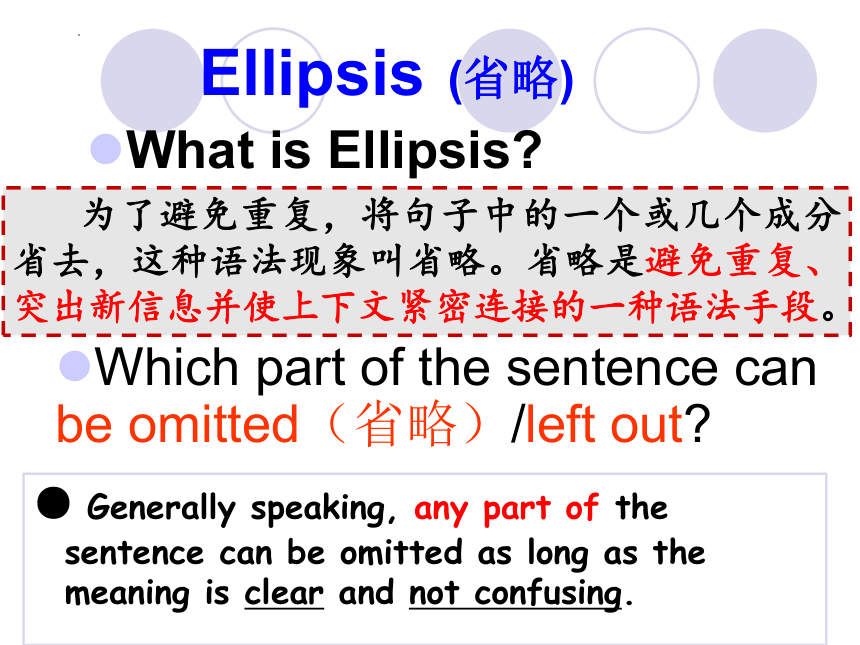 | |
| 格式 | pptx | ||
| 文件大小 | 667.9KB | ||
| 资源类型 | 教案 | ||
| 版本资源 | 人教版(2019) | ||
| 科目 | 英语 | ||
| 更新时间 | 2022-11-13 12:55:34 | ||
图片预览

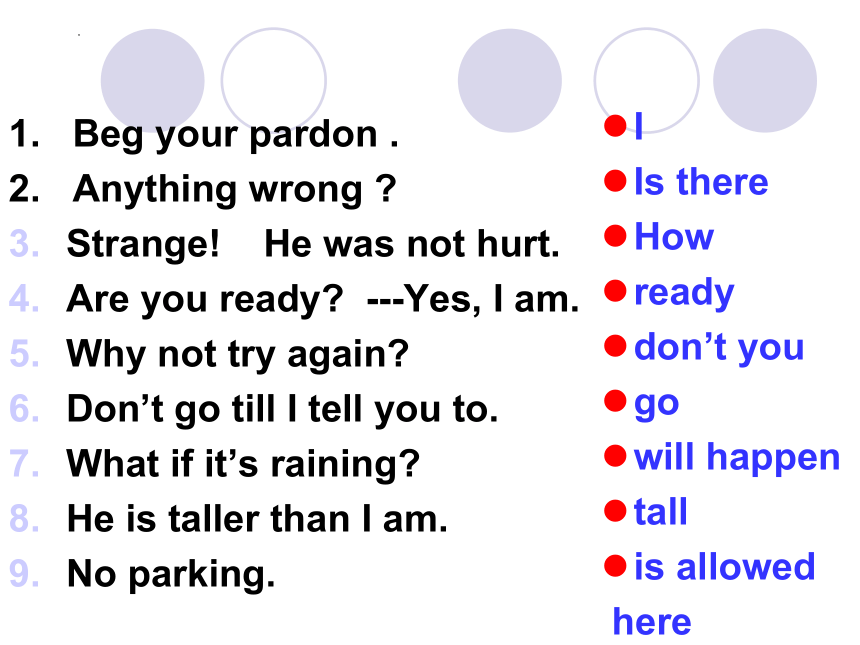
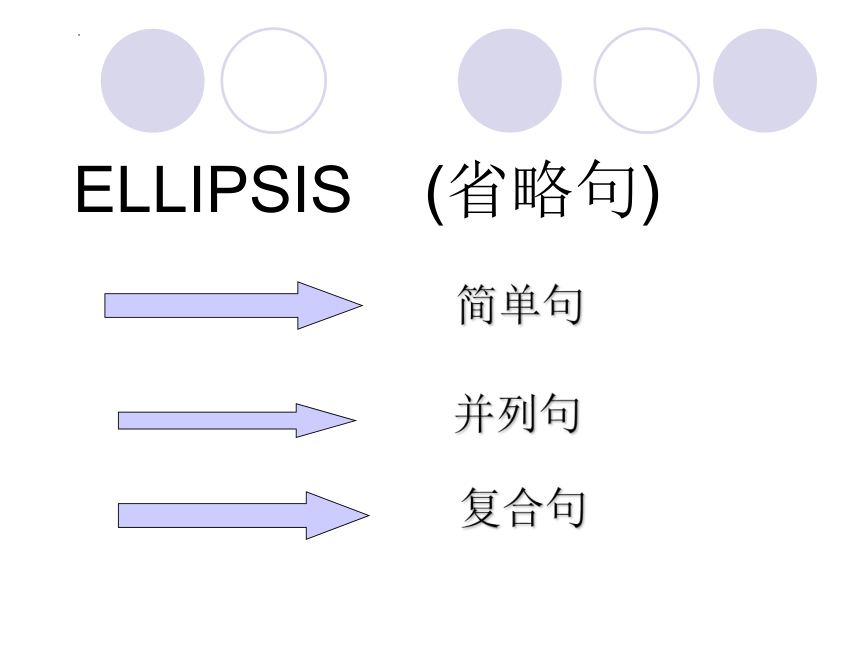
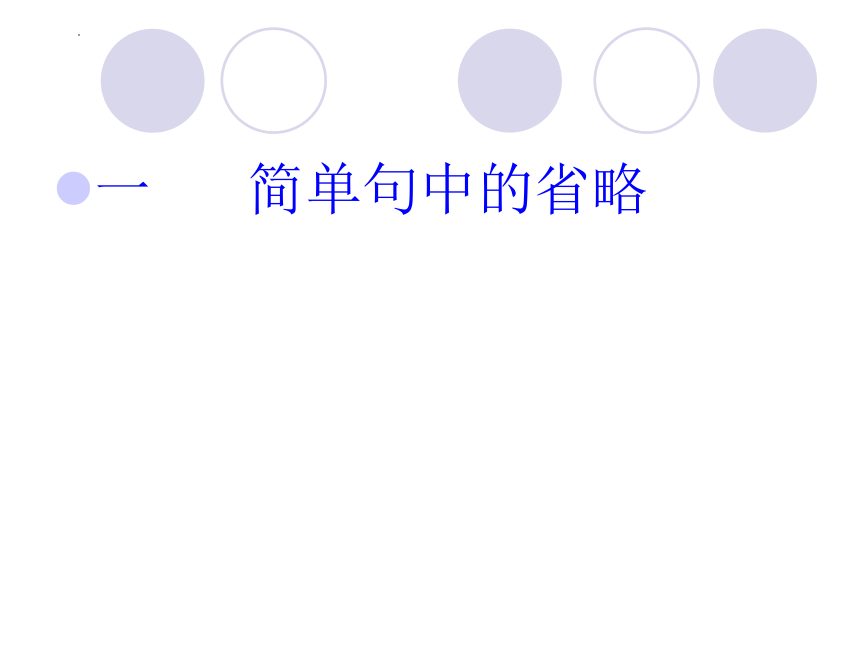
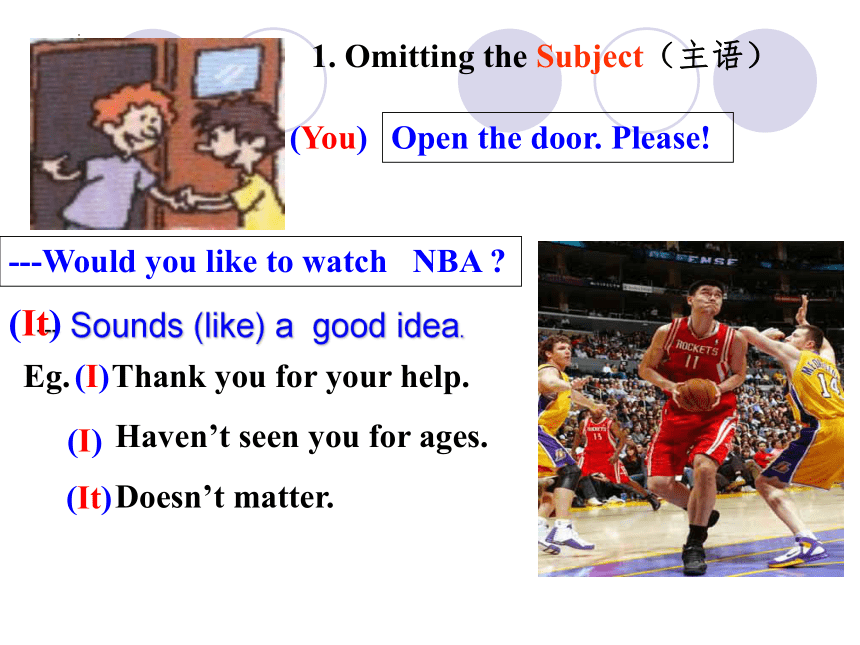
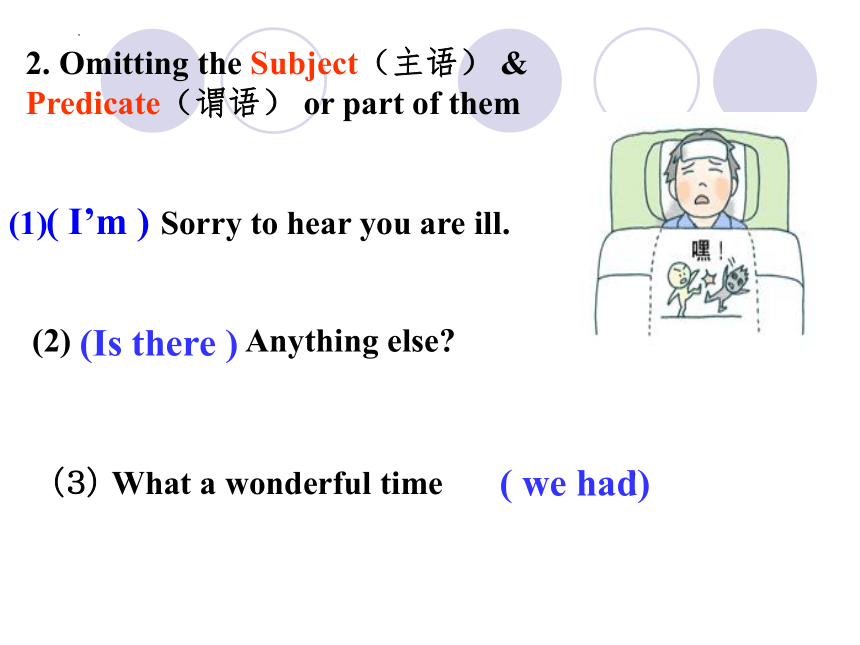
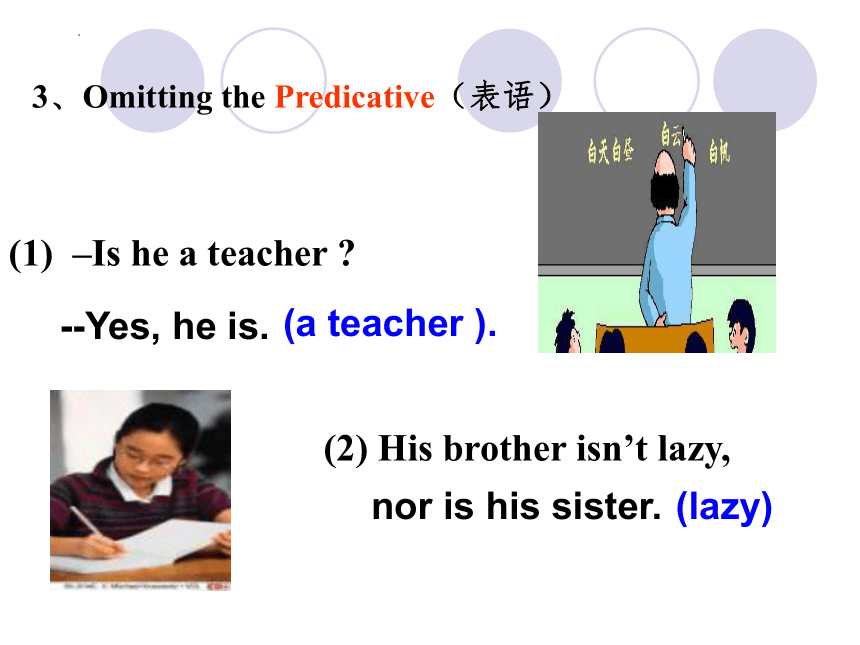
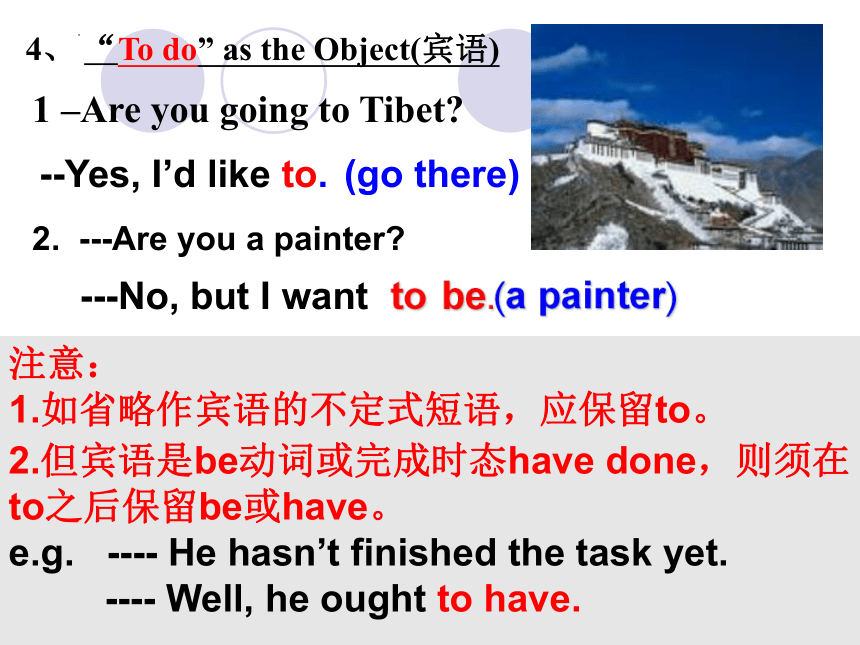
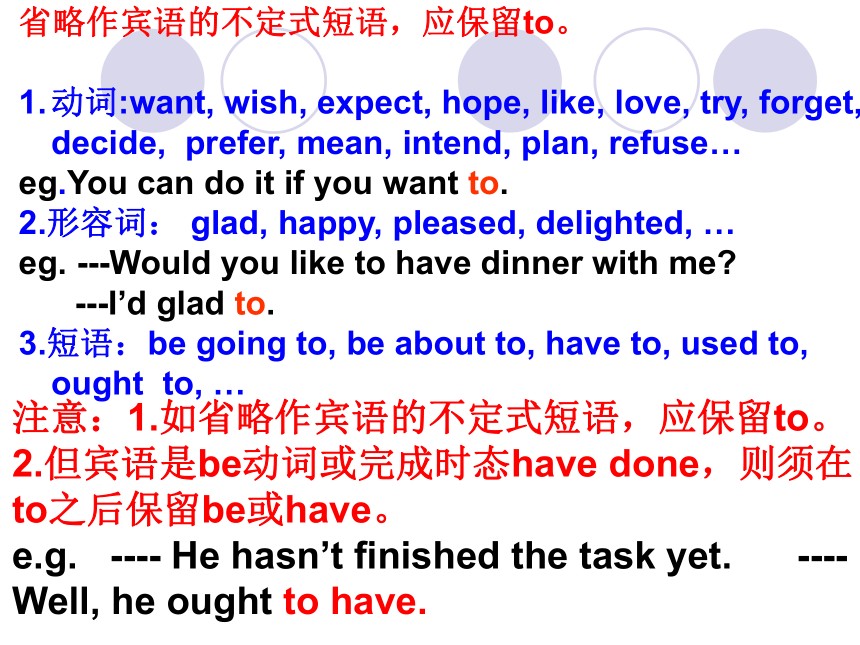
文档简介
(共22张PPT)
Ellipsis
What is Ellipsis
Some words can be left out when we do not want to repeat them. This is called ellipsis.
Which part of the sentence can be omitted(省略)/left out
(省略)
● Generally speaking, any part of the sentence can be omitted as long as the meaning is clear and not confusing.
为了避免重复,将句子中的一个或几个成分省去,这种语法现象叫省略。省略是避免重复、突出新信息并使上下文紧密连接的一种语法手段。
1. Beg your pardon .
2. Anything wrong
Strange! He was not hurt.
Are you ready ---Yes, I am.
Why not try again
Don’t go till I tell you to.
What if it’s raining
He is taller than I am.
No parking.
I
Is there
How
ready
don’t you
go
will happen
tall
is allowed
here
ELLIPSIS (省略句)
简单句
并列句
复合句
一 简单句中的省略
Open the door. Please!
---Would you like to watch NBA
Eg. Thank you for your help.
Haven’t seen you for ages.
Doesn’t matter.
--- Sounds (like) a good idea.
(I)
(I)
(It)
(You)
(It)
1. Omitting the Subject(主语)
2. Omitting the Subject(主语) & Predicate(谓语) or part of them
Sorry to hear you are ill.
(2) Anything else
(3) What a wonderful time !
( I’m )
(Is there )
( we had)
3、Omitting the Predicative(表语)
–Is he a teacher
(2) His brother isn’t lazy,
--Yes, he is.
nor is his sister.
(a teacher ).
(lazy)
1 –Are you going to Tibet
4、 “To do” as the Object(宾语)
--Yes, I’d like to.
2. ---Are you a painter
---No, but I want
to
(a painter)
(go there)
2.但宾语是be动词或完成时态have done,则须在to之后保留be或have。
e.g. ---- He hasn’t finished the task yet.
---- Well, he ought to have.
注意:
1.如省略作宾语的不定式短语,应保留to。
be.
省略作宾语的不定式短语,应保留to。
动词:want, wish, expect, hope, like, love, try, forget, decide, prefer, mean, intend, plan, refuse…
eg.You can do it if you want to.
2.形容词: glad, happy, pleased, delighted, …
eg. ---Would you like to have dinner with me
---I’d glad to.
3.短语:be going to, be about to, have to, used to, ought to, …
注意:1.如省略作宾语的不定式短语,应保留to。
2.但宾语是be动词或完成时态have done,则须在to之后保留be或have。
e.g. ---- He hasn’t finished the task yet. ---- Well, he ought to have.
几点补充:
1、感叹句根据上下文的省略。
e.g. What a wonderful film (it is)!
2、介词的省略:
have a hard time (in) doing sth.
waste time (in) doing sth.,
spend …(in) doing sth.
prevent/stop…(from)…,
be busy (in) doing…,
be engaged (in) doing…,
there’s no use/point (in) doing…
He failed (in) the game.
The war lasted (for) four years.
I had some trouble (in) finding his home.
Please don’t waste time (in) talking about it any more.
His mother prevented him (from)surfing the Internet.
3、情态动词should的省略.
下列表示(坚持,命令,建议,要求)动词的从句后:insist, order, command, suggest, propose,
advise,demand, require, request, ask
eg. He suggested the sports meeting (should) be put off till next week.
They insisted that the boy (should) go with them.
It’s necessary that sb. (should) do
类似的形容词有…
important, impossible, strange, natural, a pity
It is necessary that he (should)go there himself.
It is desired that we (should) get everything ready
tonight.
二 . 并列句中的省略
两个并列分句中,后一个分句常省略与前一分句中
相同的部分。
My father is a doctor and
my mother is a nurse.
The news made me happy,
but the news made Tom angry.
He came into the room and he turned on the TV.
三. 复合句的省略
--- Do you think it will rain
--- Do you think it will rain
1) How so Why so
2) Is that so
3)I suppose/believe/
hope/think so/not.
4) I don’t think so
--- I don’t think so .
( I think not.)
(I don’t think that it will rain )
--- I think so .
英语中,可以使用so, not等来省略上文或问句中的一部分或整个句子。
(that it will rain )
If it is heated , the water becomes steam.
While you are crossing the road, you must be very careful.
状语从句的省略
在(when, while, whenever, as soon as, if, unless, as if/though, as, whether等引导的)状语从句中,若谓语动词有be,而主语又与主句主语相同或是it时,则从句主语和be常被省略。
用省略结构改写下列复合句。
1. Though they were tired, they went on working.
→ __________, they went on working.
2. When it is heated, a piece of ice will turn into water.
→ _____________, a piece of ice will turn into water.
3. Although he was hard-working, he couldn’t earn enough to support himself.
→ _____________________, he couldn’t earn enough to support himself.
Though tired
When heated
Ellipsis in clause
即学即练
Although hard-working
请将下面的省略结构改回为复合句。
If necessary, we shall send a telegram home.
Whenever possible, he will come to my help.
While cycling, don ' t forget the traffic lights.
即学即练
If (it is)necessary, we shall send a telegram home.
Whenever (it is) possible, he will come to my help.
While (you are) cycling, don’t forget the traffic lights.
定语从句中的省略
I like the dress that/which you bought for me.
My bike which was stolen the other day was found again.
1.在限制性定语从句中,作宾语的关系代词which ,that.whom
常可省略
2.定语从句中,作主语的关系代词和be动词常可省略.
其他常见的省略
1. 某些使役动词,如:make、let、have和感官动词,如:see,watch, notice、observe、hear等后面作宾补的不定式常省略to,但若用于被动语态,则to不省略。
We often hear her sing English songs in the classroom.
我们经常听到她在教室里唱英文歌。
She is often heard to sing English songs in the classroom.
(四)其它省略
1、连词that的省略:
①、宾语从句中常省略连词that,但也有不能省略的情况
be+某些形容词( afraid, sure, sorry, certain, glad…);
两个(或两个以上)宾语从句并列时;
He said that, if he could manage it, he would come for dinner.
②、在定语从句中,that在从句中作宾语/表语/There be
结构的主语时可省略。
I’m not the man (that) I was when you knew me first.
This is the fastest train (that) there is to Beijing.
This is the best way (that) we should choose.
I don’t like the way (that)/in which he talks to his parents.
③、引导主语从句、同位语从句等的连词that一般不可省略。
在表语从句中偶尔可省略。
What they want to do is (that) they go to play basketball.
2、不定式符号to的省略
①、并列的不定式可省去后面的to。
e.g. I told him to sit down and wait for a moment.
To be for the plan or to be against the plan doesn’t matter.
②、当不定式作表语时,如果前面主语中出现实义动词do及各种形式,
则不定式可省略。
What he wants to do is (to) go home.
③ 、某些使役动词(如let, make, have)及感官动词
(如see, watch, notice, hear, feel, look at和listen to等)
后面作宾语补足语的不定式一定要省去to,
但在被动语态中须把to加上。
e.g. ---- I saw the boy fall from the tree.
---- The boy was seen to fall from the tree.
④、介词but/except/besides前若有动词do,后面的不定式不带to。
e.g. The boy did nothing but play.
3、在某些状语从句中,从句的主语(或it)与主句主语
一致时,可省去“主语 + be”部分或从句的主语it。
(参看“状语从句”有关部分)
Look out for cars when crossing the street.
Fill in the blanks with articles where necessary.
She worked extremely hard though still rather poor in health.
在比较状语从句中,than或as后面的部分可省略。
Tom plays football as well as, if not better than, Jack.
(=Tom plays football as well as Jack does, if he doesn’t
play better than Jack does.)
We should think more of our class than of ourselves.
4、连词if在部分虚拟条件句中可省略,
但后面的语序有变化(参见“倒装句”有关部分)
5、主句与从句各有一些成分省略。
e.g. The sooner (you do it), the better (it will be).
Ellipsis
What is Ellipsis
Some words can be left out when we do not want to repeat them. This is called ellipsis.
Which part of the sentence can be omitted(省略)/left out
(省略)
● Generally speaking, any part of the sentence can be omitted as long as the meaning is clear and not confusing.
为了避免重复,将句子中的一个或几个成分省去,这种语法现象叫省略。省略是避免重复、突出新信息并使上下文紧密连接的一种语法手段。
1. Beg your pardon .
2. Anything wrong
Strange! He was not hurt.
Are you ready ---Yes, I am.
Why not try again
Don’t go till I tell you to.
What if it’s raining
He is taller than I am.
No parking.
I
Is there
How
ready
don’t you
go
will happen
tall
is allowed
here
ELLIPSIS (省略句)
简单句
并列句
复合句
一 简单句中的省略
Open the door. Please!
---Would you like to watch NBA
Eg. Thank you for your help.
Haven’t seen you for ages.
Doesn’t matter.
--- Sounds (like) a good idea.
(I)
(I)
(It)
(You)
(It)
1. Omitting the Subject(主语)
2. Omitting the Subject(主语) & Predicate(谓语) or part of them
Sorry to hear you are ill.
(2) Anything else
(3) What a wonderful time !
( I’m )
(Is there )
( we had)
3、Omitting the Predicative(表语)
–Is he a teacher
(2) His brother isn’t lazy,
--Yes, he is.
nor is his sister.
(a teacher ).
(lazy)
1 –Are you going to Tibet
4、 “To do” as the Object(宾语)
--Yes, I’d like to.
2. ---Are you a painter
---No, but I want
to
(a painter)
(go there)
2.但宾语是be动词或完成时态have done,则须在to之后保留be或have。
e.g. ---- He hasn’t finished the task yet.
---- Well, he ought to have.
注意:
1.如省略作宾语的不定式短语,应保留to。
be.
省略作宾语的不定式短语,应保留to。
动词:want, wish, expect, hope, like, love, try, forget, decide, prefer, mean, intend, plan, refuse…
eg.You can do it if you want to.
2.形容词: glad, happy, pleased, delighted, …
eg. ---Would you like to have dinner with me
---I’d glad to.
3.短语:be going to, be about to, have to, used to, ought to, …
注意:1.如省略作宾语的不定式短语,应保留to。
2.但宾语是be动词或完成时态have done,则须在to之后保留be或have。
e.g. ---- He hasn’t finished the task yet. ---- Well, he ought to have.
几点补充:
1、感叹句根据上下文的省略。
e.g. What a wonderful film (it is)!
2、介词的省略:
have a hard time (in) doing sth.
waste time (in) doing sth.,
spend …(in) doing sth.
prevent/stop…(from)…,
be busy (in) doing…,
be engaged (in) doing…,
there’s no use/point (in) doing…
He failed (in) the game.
The war lasted (for) four years.
I had some trouble (in) finding his home.
Please don’t waste time (in) talking about it any more.
His mother prevented him (from)surfing the Internet.
3、情态动词should的省略.
下列表示(坚持,命令,建议,要求)动词的从句后:insist, order, command, suggest, propose,
advise,demand, require, request, ask
eg. He suggested the sports meeting (should) be put off till next week.
They insisted that the boy (should) go with them.
It’s necessary that sb. (should) do
类似的形容词有…
important, impossible, strange, natural, a pity
It is necessary that he (should)go there himself.
It is desired that we (should) get everything ready
tonight.
二 . 并列句中的省略
两个并列分句中,后一个分句常省略与前一分句中
相同的部分。
My father is a doctor and
my mother is a nurse.
The news made me happy,
but the news made Tom angry.
He came into the room and he turned on the TV.
三. 复合句的省略
--- Do you think it will rain
--- Do you think it will rain
1) How so Why so
2) Is that so
3)I suppose/believe/
hope/think so/not.
4) I don’t think so
--- I don’t think so .
( I think not.)
(I don’t think that it will rain )
--- I think so .
英语中,可以使用so, not等来省略上文或问句中的一部分或整个句子。
(that it will rain )
If it is heated , the water becomes steam.
While you are crossing the road, you must be very careful.
状语从句的省略
在(when, while, whenever, as soon as, if, unless, as if/though, as, whether等引导的)状语从句中,若谓语动词有be,而主语又与主句主语相同或是it时,则从句主语和be常被省略。
用省略结构改写下列复合句。
1. Though they were tired, they went on working.
→ __________, they went on working.
2. When it is heated, a piece of ice will turn into water.
→ _____________, a piece of ice will turn into water.
3. Although he was hard-working, he couldn’t earn enough to support himself.
→ _____________________, he couldn’t earn enough to support himself.
Though tired
When heated
Ellipsis in clause
即学即练
Although hard-working
请将下面的省略结构改回为复合句。
If necessary, we shall send a telegram home.
Whenever possible, he will come to my help.
While cycling, don ' t forget the traffic lights.
即学即练
If (it is)necessary, we shall send a telegram home.
Whenever (it is) possible, he will come to my help.
While (you are) cycling, don’t forget the traffic lights.
定语从句中的省略
I like the dress that/which you bought for me.
My bike which was stolen the other day was found again.
1.在限制性定语从句中,作宾语的关系代词which ,that.whom
常可省略
2.定语从句中,作主语的关系代词和be动词常可省略.
其他常见的省略
1. 某些使役动词,如:make、let、have和感官动词,如:see,watch, notice、observe、hear等后面作宾补的不定式常省略to,但若用于被动语态,则to不省略。
We often hear her sing English songs in the classroom.
我们经常听到她在教室里唱英文歌。
She is often heard to sing English songs in the classroom.
(四)其它省略
1、连词that的省略:
①、宾语从句中常省略连词that,但也有不能省略的情况
be+某些形容词( afraid, sure, sorry, certain, glad…);
两个(或两个以上)宾语从句并列时;
He said that, if he could manage it, he would come for dinner.
②、在定语从句中,that在从句中作宾语/表语/There be
结构的主语时可省略。
I’m not the man (that) I was when you knew me first.
This is the fastest train (that) there is to Beijing.
This is the best way (that) we should choose.
I don’t like the way (that)/in which he talks to his parents.
③、引导主语从句、同位语从句等的连词that一般不可省略。
在表语从句中偶尔可省略。
What they want to do is (that) they go to play basketball.
2、不定式符号to的省略
①、并列的不定式可省去后面的to。
e.g. I told him to sit down and wait for a moment.
To be for the plan or to be against the plan doesn’t matter.
②、当不定式作表语时,如果前面主语中出现实义动词do及各种形式,
则不定式可省略。
What he wants to do is (to) go home.
③ 、某些使役动词(如let, make, have)及感官动词
(如see, watch, notice, hear, feel, look at和listen to等)
后面作宾语补足语的不定式一定要省去to,
但在被动语态中须把to加上。
e.g. ---- I saw the boy fall from the tree.
---- The boy was seen to fall from the tree.
④、介词but/except/besides前若有动词do,后面的不定式不带to。
e.g. The boy did nothing but play.
3、在某些状语从句中,从句的主语(或it)与主句主语
一致时,可省去“主语 + be”部分或从句的主语it。
(参看“状语从句”有关部分)
Look out for cars when crossing the street.
Fill in the blanks with articles where necessary.
She worked extremely hard though still rather poor in health.
在比较状语从句中,than或as后面的部分可省略。
Tom plays football as well as, if not better than, Jack.
(=Tom plays football as well as Jack does, if he doesn’t
play better than Jack does.)
We should think more of our class than of ourselves.
4、连词if在部分虚拟条件句中可省略,
但后面的语序有变化(参见“倒装句”有关部分)
5、主句与从句各有一些成分省略。
e.g. The sooner (you do it), the better (it will be).
